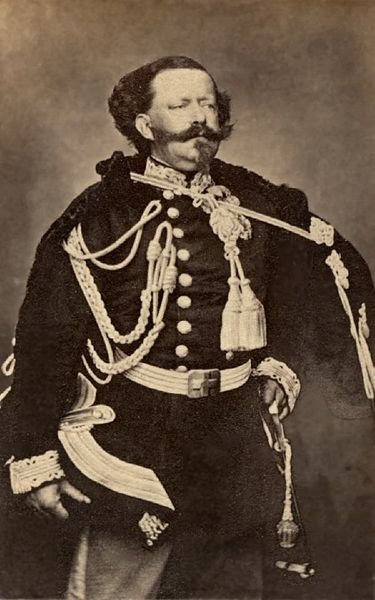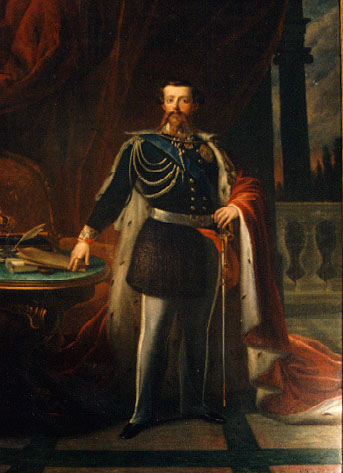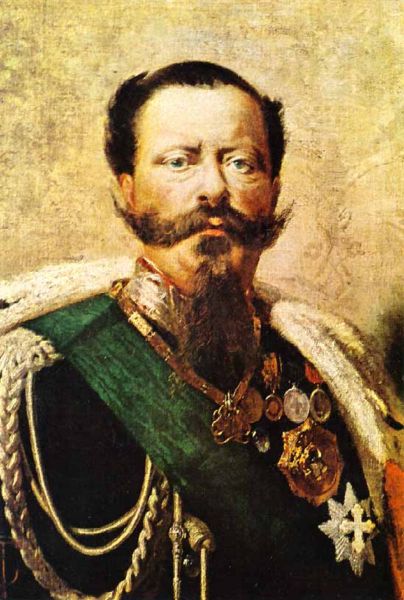<Back to Index>
- Physicist Albert Einstein, 1879
- Composer Johann Strauss, Sr., 1804
- King of Italy Vittorio Emmanuele II, 1820



Vittorio Emmanuele II (14 March 1820 – 9 January 1878) was the King of Piedmont, Savoy, and Sardinia from 1849 to 1861. On 18 February 1861, he assumed the title King of Italy to become the first king of a united Italy, a title he held until his death in 1878. The Italians gave him the epithet Father of the Fatherland (Italian: Padre della Patria).
Vittorio Emmanuele was born the eldest son of Charles Albert of Sardinia and Maria Theresa of Austria and Tuscany. His father was King of Piedmont-Sardinia. He lived for some years of his youth in Florence and showed an early interest in politics, the military, and sports. He took part in the First Italian War of Independence under his father, fighting in the front line at the battles of Pastrengo, Santa Lucia, Goito and Custoza.
He became King of Piedmont-Sardinia in 1849 when his father had abdicated the throne after a humiliating military defeat by the Austrians at Novara. Vittorio Emmanuele was immediately able to obtain a rather favorable armistice at Vignale by the Austrian commander, Radetzky. The treaty, however, was not ratified by the Piedmontese chamber, and Vittorio Emmanuele retaliated by firing Prime Minister Claudio Gabriele de Launay, replacing him with Massimo D'Azeglio. After new elections, the peace with Austria was accepted by the new Chamber of Deputies. In 1849 he also fiercely suppressed the revolt in Genoa.
In 1852, Vittorio Emmanuele II gave Count Camillo di Cavour the
title of Prime Minister. This turned out to be a wise choice because
Cavour was a political mastermind and a major player in Italian
unification in his own right. Vittorio Emmanuele II soon became the
symbol of the Italian Risorgimento,
the Italian unification movement. He was especially popular in the
Kingdom of Sardinia because of his respect for the new constitution and
his liberal reforms. Following Vittorio Emmanuele's advice, Cavour joined Britain and France in the Crimean War against
Russia. Cavour was reluctant to go to war due to the power of Russia at
the time and the expense of doing so. Vittorio Emmanuele, however, was
convinced of the rewards to be gained from the alliance created between
Britain and, more importantly, France. After
successfully seeking British support and ingratiating himself with
France and Napoleon III at the Congress of Paris in 1856 at the end of
the war, Count Cavour arranged a secret meeting with the French
emperor. In 1858, they met at Plombières-les-Bains (in Lorraine), where they agreed that if the French were to help Piedmont combat Austria, which still occupied Lombardy and Venetia in northern Italy, France would be awarded Nice and Savoy. At the time, Vittorio Emmanuele had become a universal symbol of the Italian Risorgimento, the movement pushing towards the unification of Italy. The
Italo-French campaign against Austria in 1859 started successfully.
However, scared by the serious casualties for France, Napoleon III
secretly made a treaty with Franz Joseph of Austria at Villafranca whereby Piedmont would only gain Lombardy. France did not as a result receive the promised Nice and Savoy, but Austria did keep Venetia,
a major setback for the Piedmontese, in no small part because the
treaty had been prepared without their knowledge. After several
quarrels about the outcome of the war, Cavour resigned, and the king
had to find other advisors. France indeed only gained Nice and Savoy
after the Treaty of Turin was
signed in March 1860 after Cavour had been reinstalled as Prime
Minister and a deal with the French was struck for plebiscites to take
place in the Central Italian Duchies. Later that same year, Vittorio Emmanuele II sent his forces to fight the papal army at Castelfidardo and drove the Pope into Vatican City. Vittorio Emmanuele II’s success at these goals got him excommunicated from the Catholic Church. Then, plebiscites in Naples and Sicily called for union with
Sardinia-Piedmont and Italy grew even larger. On 18 February 1861 the
Kingdom of Italy was officially established and Vittorio Emmanuele II
became its king. Later, in 1866, Italy was given Venetia as part of the
peace settlement after the Seven Weeks War.
Five years after that (1871), the Papal States, protected by Napoleon
III ,
fell to Italian troops and Rome became the capital city. Vittorio Emmanuele supported Giuseppe Garibaldi's Expedition of Thousand (1860-1861), which resulted in the quick fall of the Kingdom of the Two Sicilies in southern Italy. However, the King halted Garibaldi when he appeared ready to attack Rome, still under the Papal States,
as it was under French protection. In 1860, through local plebiscites,
Tuscany, Modena, Parma and Romagna decided to side with
Sardinia-Piedmont. Vittorio Emmanuele then marched victoriously in the Marche and Umbria after the victorious battle of Castelfidardo (1860) over the Papal forces, after which he gained a Papal excommunication. The King subsequently met with Garibaldi at Teano,
receiving from him the control of southern Italy. Another series of
plebiscites in the occupied lands resulted in the proclamation of
Vittorio Emmanuele as the first King of Italy by the new Parliament of unified Italy, on 17 March 1861. Turin became the capital of the new state. Only Rome, Veneto, and Trentino remained to be conquered. In 1866 Victor Emmanuel allied himself with Prussia in the Third Italian War of Independence. Although not victorious in the Italian theater, he managed anyway to receive Veneto after the Austrian defeat in Germany. In 1871, after two failed attempts by Garibaldi, he also took advantage of the Prussian victory over France in the Franco-Prussian War to
capture Rome after the French withdrew. He entered Rome on 20 September
1871 and set up the new capital there on 2 July 1871, (after a
temporary move to Florence in 1864). The new Royal residence was the Quirinal Palace. The
rest of Vittorio Emmanuele II’s reign was much quieter. After the
Kingdom of Italy was established he decided to continue on as King
Vittorio Emmanuele II instead of Vittorio Emmanuele I of Italy. This
was a terrible move as far as public relations went as it was not
indicative of the fresh start that the Italian people wanted and
suggested that Sardinia-Piedmont had taken over the Italian Peninsula,
rather than unifying it. Despite this mishap, the remainder of Vittorio
Emmanuele II’s reign was consumed by wrapping up loose ends and dealing
with economic and cultural issues. Vittorio Emmanuele died in Rome in 1878, just after the reversal of excommunication by Pope Pius IX's envoys. He was buried in the Pantheon. His successor was his son Umberto I.